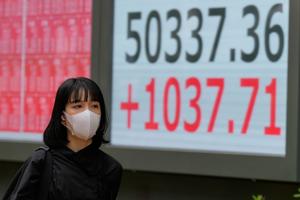Asian shares experienced a significant rise on Monday following comments from U.S. President Donald Trump, who expressed optimism about a potential trade agreement with China. This announcement positively influenced market sentiment, although European indices remained relatively stable.
In Japan, the benchmark Nikkei 225 surged by 2.5% to close at 50,512.32, marking a new high. The upward trend was largely attributed to investor confidence stemming from the expectation that Trump and Chinese leader Xi Jinping would finalize a trade deal during an upcoming high-stakes meeting. Meanwhile, in Europe, Germany’s DAX saw a modest gain of 0.2%, reaching 24,279.53, while France’s CAC 40 and the UK’s FTSE 100 both dipped slightly by 0.1%, closing at 8,218.42 and 9,640.12, respectively.
Trump made these remarks after his attendance at a summit in Malaysia, where preliminary trade agreements were reached with several Southeast Asian nations, including Thailand, Cambodia, and Vietnam. In his comments to reporters, Trump stated, “I have a lot of respect for President Xi. I think we’re going to come away with a deal.”
Notably, Chinese markets also recorded solid gains. The Hang Seng index in Hong Kong rose by 1.1% to reach 26,434.69, while the Shanghai Composite increased by 1.2% to close at 3,996.94. Stephen Innes, a strategist at SPI Asset Management, noted that behind the diplomatic gestures, both Washington and Beijing have quietly laid the groundwork for a framework that could prevent further economic discord.
Trump’s Asian tour continued as he traveled to Japan on Monday, with plans to conclude his trip in South Korea. His visit coincides with the Asia-Pacific Economic Cooperation (APEC) forum, where he is expected to meet with Xi on the sidelines.
In Japan, the newly installed Prime Minister Sanae Takaichi has garnered significant public support for her market-friendly policies. Companies in the defense sector, such as Kawasaki Heavy Industries and IHI Corp., saw their stocks rise sharply, reflecting investor confidence in Takaichi’s strategy, which includes plans to increase defense spending.
Conversely, the U.S. has long expressed dissatisfaction with Japan’s automotive market, with Trump previously imposing tariffs on American imports. As part of ongoing negotiations, Japan’s government has proposed purchasing a fleet of Ford F-150 trucks to aid in infrastructure inspections, underscoring the complexities of bilateral trade discussions.
In South Korea, the Kospi index increased by 2.6% to a record level of 4,042.83, driven by hopes for a trade agreement with the United States. Australian markets also reflected positive sentiment, with the S&P/ASX 200 rising by 0.4% to 9,055.60. Other notable gains were seen in Taiwan, with a 1.7% increase in the Taiex, and a 0.7% rise in India’s Sensex index.
Despite the optimistic outlook for trade agreements, a recent report from the APEC secretariat forecasted that economic growth in the region would slow to 3% this year, down from 3.6% in the previous year. This slowdown is attributed to ongoing trade restrictions and elevated tariffs.
On Wall Street, U.S. stocks reached record highs on Friday following a favorable inflation report, which showed less severe inflation than anticipated. The S&P 500 rose by 0.8% to 6,791.69, surpassing its previous all-time high. The Dow Jones Industrial Average climbed 1% to reach 47,207.12, while the Nasdaq composite increased by 1.1% to a record of 23,204.87. This positive inflation data is seen as a potential catalyst for the Federal Reserve to continue reducing interest rates, which could benefit the struggling job market.
In commodity markets, U.S. benchmark crude oil prices fell, with a decline of 66 cents to $60.84 per barrel. Similarly, Brent crude dropped by 67 cents to trade at $64.53 per barrel. The U.S. dollar strengthened slightly against the Japanese yen, trading at 152.77 yen, while the euro also saw a minor increase, rising to $1.1639.
As global markets react to these developments, the focus remains on the evolving trade landscape and its implications for economies worldwide.






